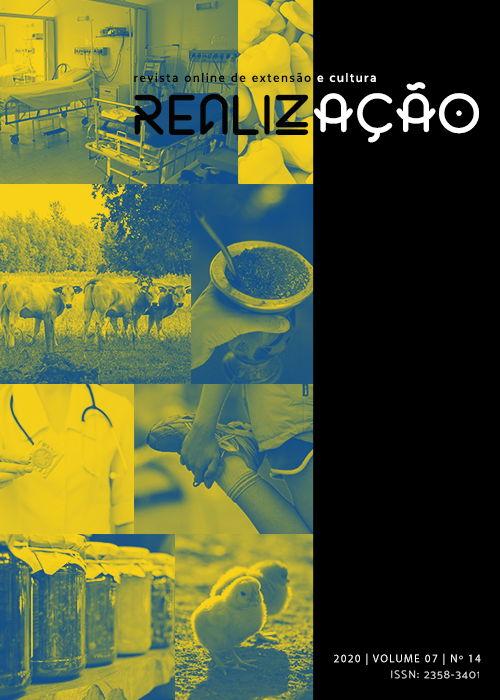Once upon a time in the hospital
DOI:
https://doi.org/10.30612/realizacao.v7i14.12613Keywords:
Children's literature, Storytelling, Reading, Hospitalized childrenAbstract
There has been a lot of talk about the therapeutic benefits provided by reading. It is not new that people find in books the key to understand their existential problems, to deal with the natural difficulties of everyday life, to evaluate and encourage themselves in the face of life's challenges, because the act of elaborating ideas from reading creates opportunities, brings people together, elevates the human being. Seeking to contribute to the fulfillment of IFPR's social role, the Extension Project - Era Uma Vez no Hospital - has as main objective to take children's literature through storytelling for children in hospitals and other institutions in Foz do Iguaçu. The visits are previously organized and planned in order to make them dynamic and optimized in order to avoid that these activities do not negatively interfere in the treatment process to which these children are submitted. We believe that the realization of this project is, without a doubt, very healthy for hospitalized children who need at the moment of their lives a little of the best we have, in order to achieve a better quality of life. But we believe, mainly, that the biggest beneficiaries with this project are the students of IFPR who have the opportunity to have the best of the public and more than that it will have the privilege of knowing the pleasure that is hidden in the magic of planting a smile in a child.Downloads
References
ALVES, Maria Helena Hees. A aplicação da Biblioterapia no processo de reintegração social. Revista Brasileira de Biblioteconomia e Documentação, v. 15, n. 1/2, jan./jun. 1982. p. 54-61.
BEUTER, Magrid. Atividade lúdica: uma contribuição para a assistência de enfermagem às mulheres portadoras de câncer. Florianópolis, 1996. Dissertação (Mestrado em Enfermagem) – Universidade Federal de Santa Catarina.
DUARTE, I. Infância. In: Duarte et al. A prática da psicoterapia infantil. Porto Alegre:
Artes Médicas, 1989. ERICSON, E. Brinquedos e razões. In Infância e sociedade. RJ. Editora Zahar, s/d.
SILVA, Stela A. da. A pessoa enferma e a hospitalização – o enfermeiro nesse contexto. Rio de Janeiro, 1992. Dissertação (Mestrado em Enfermagem) – Universidade Federal do Rio de Janeiro.
CARDOSO, Flávia Tanes. Câncer infantil: aspectos emocionais e atuação do psicólogo. In http://pepsic.bvsalud.org/pdf/rsbph/v10n1/v10n1a04.pdf. Acesso 15/05/2020.
BRASIL, Referencial Curricular Para a Educação Infantil. Vol. 1. Brasília: MEC/SEI, 1998.
CARVALHO, Maria Campos de; RUBIANO, Márcia R. Bonagamba. Organização dos Espaços em Instituições Pré-Escolares. In: OLIVEIRA, Zilma Morais. (org.) Educação Infantil: muitos olhares. 5. ed. São Paulo: Cortez, 2001.
DAVIS, Claudia. OLIVEIRA, Zilma. Psicologia na educação. São Paulo: Cortez, 1993.
LIMA, Elvira de Souza. Como a criança pequena se desenvolve. São Paulo: Sobradinho, 2001.
OLIVEIRA, Vera Barros de. O brincar e a criança do nascimento aos seis anos. Petrópolis: Vozes, 2000.
OLIVEIRA, Zilma de M. Ramos. A criança e seu desenvolvimento. Perspectiva para se discutir a educação infantil. 3. ed. São Paulo: Cortez, 2001.
Downloads
Published
How to Cite
Issue
Section
License
Copyright (c) 2020 Marcia Palharini Pessini

This work is licensed under a Creative Commons Attribution-NonCommercial-ShareAlike 4.0 International License.
Autores que publicam nesta revista aceitam as normas de publicação, bem como, concordam com os seguintes termos:
(a) O Conselho Editorial se reserva ao direito de efetuar, nos originais, alterações da Língua portuguesa para se manter o padrão culto da língua, respeitando, porém, o estilo dos autores.
(b) Autores mantêm os direitos autorais e concedem à revista o direito de primeira publicação, com o trabalho simultaneamente licenciado sob a Creative Commons Atribuição-NãoComercial-CompartilhaIgual 4.0 Internacional que permite: Compartilhar — copiar e redistribuir o material em qualquer suporte ou formato e Adaptar — remixar, transformar, e criar a partir do material. A Creative Commons Atribuição-NãoComercial-CompartilhaIgual 4.0 Internacional considera os termos seguintes:
- Atribuição — Você deve dar o crédito apropriado, prover um link para a licença e indicar se mudanças foram feitas. Você deve fazê-lo em qualquer circunstância razoável, mas de nenhuma maneira que sugira que o licenciante apoia você ou o seu uso.
- NãoComercial — Você não pode usar o material para fins comerciais.
- CompartilhaIgual — Se você remixar, transformar, ou criar a partir do material, tem de distribuir as suas contribuições sob a mesma licença que o original.
- Sem restrições adicionais — Você não pode aplicar termos jurídicos ou medidas de caráter tecnológico que restrinjam legalmente outros de fazerem algo que a licença permita.


